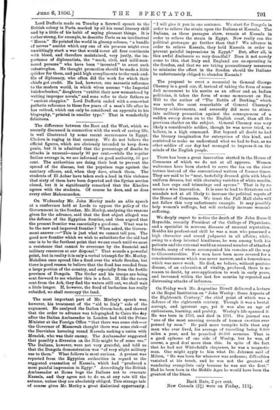The most important part of Mr. Morley's speech was, however,
his treatment of the "aid to Italy" side of the argument. He analysed the Italian Green-book, and showed that the order to advance was telegraphed to Cairo the day after the Italian Ambassador in London had told the Prime Minister at the Foreign Office " that there was some risk—or the Governor of Massowah thought there was some risk—of the Dervishes hovering round Kassala making a union with Menelek, who was their enemy. The Ambassador suggested that possibly a diversion on the Nile might be of some use." The Italians, however, were not very grateful, and told us that the Dongola demonstration was "of very slight military use to them." What follows is most curious. A protest was reported from the Egyptian authorities in regard to the suggested evacuation of Kassala, which had "produced a most painful impression in Egypt." Accordingly the British Ambassador at Rome begs the Italians not to evacuate Kassala, and they agree not to do so, at any rate till the autumn, unless they are absolutely obliged. This strange tale of coarse gives Mr. Morley a great dialectical opportunity.
" I will give it you in one sentence. We start for Dongola in order to relieve the strain upon the Italians at Kassala. The Italians, as these passages show, remain at Kassala in order to relieve the strain in Egypt. Now really can the political grotesque go further than that ? We advance in order to relieve Kassala, they hold Kassala in order to prevent painful impressions in Egypt." But., after all, is this awful disclosure so very dreadful ? Does it not merely come to this, that Italy and England are co-operating in the Soudan, and that we are taking precautionary measures to minimise the effect in the Soudan should the Italians be unfortunately obliged to abandon Kassala?






































 Previous page
Previous page